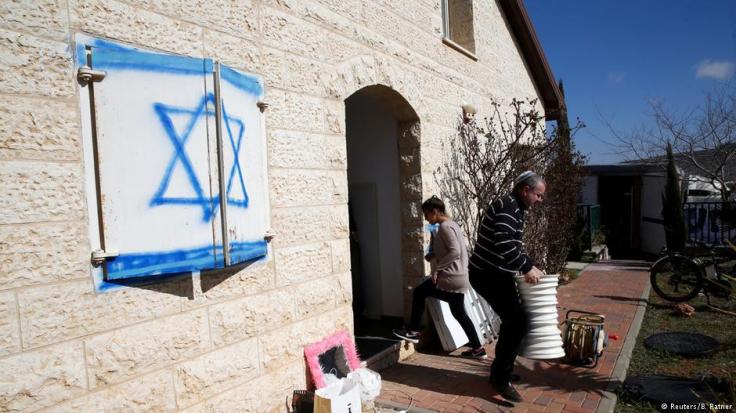Trump says Israel should be 'reasonable' in peace process

US President Trump has described Israeli settlement growth as detrimental to achieving peace in the Middle East. The statement came ahead of a meeting between the president and Israeli Prime Minister Benjamin Netanyahu.
In his first criticism of Israel since taking office, US President Trump said Friday he does not think Israel's plans to extend settlements will be beneficial to achieving peace.
"I am not somebody that believes that going forward with these settlements is a good thing for peace," Trump said in an interview with the Israeli newspaper "Yisrael Hayom." "Every time you take land for settlements, there is less land left."
Trump also told the paper that he would "like to see peace" between Israel and Palestine and he believes a "deal should be made, and it can be made."
Wary international observers see Israeli Prime Minister Benjamin Netanyahu's expansionist settlement policies as the beginning of the West Bank's annexation, a move that would effectively end any prospects of a two-state solution.
Since Trump's inauguration, Netanyahu has announced the construction of more than 5,000 settlement homes.
The American president's interview came at the end of the same week that the Israeli parliament voted to retroactively legalize over 50 settlement outposts in the West Bank, though the law is subject to review by Israel's Supreme Court. The Trump administration did not join the international community in condemning the bill's passage on Tuesday.
Back tracking?
However, Trump's opposition to the settlement and a direct appeal for "Israel to be reasonable with respect to peace," alongside a call for "reasonableness" from both sides, marked a clear departure from his brash campaign-trail rhetoric.
In the lead-up to the November 2016 election, he articulated an aggressive pro-Israeli position, including calling to move the US Embassy from Tel Aviv to Jerusalem, which both Israelis and Palestinians consider to be their capital. No countries currently have their embassies in the city.
The US president also appeared to step back from his relocation promise, instead suggesting the move was still in consideration.
"The embassy is not an easy decision. It has obviously been out there for many, many years, and nobody has wanted to make that decision. I'm thinking about it very seriously, and we will see what happens," Trump said.
Trump has, however, nominated David Friedman, a pro-settlement hardliner, as the US ambassador to Israel. At the announcement of his nomination, Friedman said he looked forward to working with Israel "from the US Embassy in Israel's eternal capital, Jerusalem."
Netanyahu visit
Netanyahu will visit the White House on Wednesday. In addition to settlements and the peace process, the two leaders will likely discuss Iran. Both Trump and the Israeli Prime Minister have criticized the Iran nuclear deal signed with the Islamic Republic under the Obama administration in 2015.
Palestinian officials have expressed their frustration with the limited contact they have had since Trump took office in January.
dw.com
